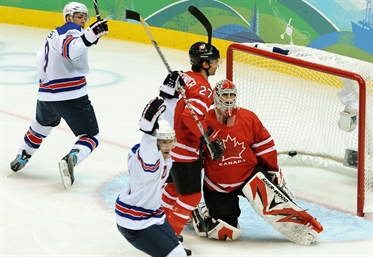When losing means winning
When losing means winning
No recent champ has been perfect wire to wire

 The U.S. beat Canada 5-3 in group play in Vancouver 2010, but Canada got the last laugh with gold on home ice. Photo: Matthew Manor / HHOF-IIHF Images
The U.S. beat Canada 5-3 in group play in Vancouver 2010, but Canada got the last laugh with gold on home ice. Photo: Matthew Manor / HHOF-IIHF Images
Likewise, Finnish fans should be glad about falling 2-1 to Canada in overtime. Meanwhile, Swedish fans should be a bit concerned about having earned nine points so far.
Why? Ever since the IIHF instituted the playoff system at the 1992 Olympics, every team that has won the gold medal has lost at least one preliminary round game.
By contrast, nations that have accumulated perfect records in the preliminary round have often suffered disasters and heartbreaks.
For instance, in 1998, Canada kicked off the first best-on-best Olympics by beating Belarus, Sweden, and the United States, but then couldn’t get the job done in the semi-final shootout against superstar goalie Dominik Hasek of the Czech Republic.
In both 2002 and 2010, the Swedes started with three straight wins, but were ousted in the quarter-finals by Belarus and Slovakia respectively. The 4-3 loss to Belarus in 2002 still ranks as the most shocking upset in Olympic history after the 1980 “Miracle on Ice” in which American college players defeated the mighty Soviet Union in Lake Placid.
In 2006, Slovakia and Finland topped their groups with five victories apiece. However, as has so often happened, the Slovaks fell to their canny “older brothers,” the Czechs, in a 3-1 quarter-final defeat. The Finns, who played the best overall in Turin, came agonizingly close to gold, losing 3-2 to archrival Sweden in the final on Nicklas Lidstrom’s goal to start the third period.
So it seems as if losing a game early on can provide a wake-up call for championship teams, helping them to avoid complacency and motivating them to truly “get better every day and every game” instead of just talking about it.
Let’s take a look back at the gold medal teams who have experienced “when losing means winning.”
1992
The Russians (called the Unified Team, as the Soviet Union ended on 26 December 1991) didn’t achieve the standard of perfection for which taskmaster coach Viktor Tikhonov always aimed. Their lone blemish was a 4-3 loss to Czechoslovakia in Pool B. They stepped up when it counted most, trouncing Finland 6-1 in the quarter-finals, downing the United States 5-2 in the semi-finals, and topping Canada 3-1 in the gold medal game.
1994
Sweden tied Slovakia 3-3 in its opener and lost 3-2 to Canada in its last round-robin game. Petr Nedved, whose Canadian citizenship enabled him to represent his adopted country in these Lillehammer Olympics, scored the game-winning goal. But when Sweden and Canada met again in the gold medal game, Magnus Svensson would tally the 3-3 tying goal with less than two minutes left. Overtime settled nothing, leaving Forsberg to bring Tre Kronor gold with his legendary one-handed shootout goal on Canada’s Corey Hirsch.
1998
In the third period of the Czech Republic’s preliminary-round encounter with Russia, Valeri Bure and Alexei Zhamnov scored 10 seconds apart to lead the Russians to a 2-1 victory. But the Czechs would have their revenge. When the two rivals met again in the gold medal game, Dominik Hasek earned a 20-save shutout and Petr Svoboda scored the winner halfway through the third period in a 1-0 triumph.
2002
Facing Swedish coach Hardy Nilsson’s “torpedo system,” Canada struggled mightily on the larger rink in Salt Lake City, proving vulnerable to stretch passes and losing 5-2 to Tre Kronor. “We’ve got to take this as a lesson,” said Canadian coach Pat Quinn. “We got hammered.” Quinn’s Toronto goalie, Curtis Joseph, was replaced by Martin Brodeur, and Canada wound up beating the Americans 5-2 in the final for its first Olympic gold in 50 years.
2006
In its first major test in Turin, Sweden flunked miserably, as Yevgeni Nabokov posted a 24-save shutout in a 5-0 win for Russia. The Swedes also lost 3-0 to Slovakia to close out the preliminary round. Nonetheless, coach Bengt-Ake Gustafsson’s squad then earned consecutive wins over Switzerland, the Czech Republic, and Finland to take its first Olympic gold since 1994.
2010
Fans of host Canada were panicking after their team fell 5-3 to the United States to wrap up the preliminary round. That led to Martin Brodeur being replaced by Roberto Luongo as Canada’s starting goalie. Afterwards, Canada hammered Germany 8-2 in the qualification playoffs, steamrolled Russia 7-3 in the quarter-finals, edged Slovakia 3-2 in the semi-finals, and won gold on Sidney Crosby’s 3-2 overtime goal in the rematch against the Americans.
Back to Overview











































